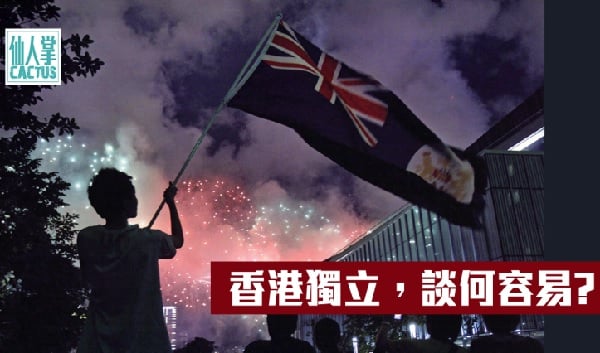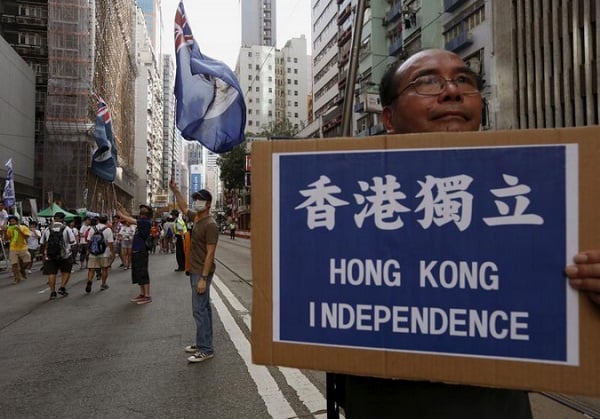
“Hong Kong independence, easier said than done?”: Anti-China protester waves former British colonial Hong Kong flag, 2015 (HK Peanut)
In 1997, the former British colony of Hong Kong was handed over to China in an agreement that the people of Hong Kong themselves had no say in whatsoever. In what may be the biggest home makeover in history, Britain had taken a nondescript corner of China from the decrepit Qing Dynasty, spent 155 years with Hong Kong natives turning it into an Asian financial and cultural capital while mainland China wallowed in self-made misery, and then simply handed it back to China irrespective of its people’s wishes in the matter. Following the 1997 handover ceremony, Britain’s Prince Charles called it “The Great Chinese Takeaway.”
Nearly two decades later, many in Hong Kong are calling for the territory to become an independent city-state along the lines of Singapore, which is probably what should have happened in the first place. Pro-independence sentiments are especially strong among young people in Hong Kong, who have now formed a pro-independence political party to field candidates for the territory’s quasi-democratic Legislative Council.
Simply put, there is no good news to be found in today’s Chinese-controlled Hong Kong, save perhaps for a pro-Beijing business elite drunk on mainland Chinese money. Public opinion polling in Hong Kong consistently reveals growing pessimism and unhappiness under Chinese rule, and an increasing number of Hong Kongers are choosing to emigrate to Britain or America rather than to remain, as China “destroys freedom” in the territory.
An independent Hong Kong may be “easier said than done” given China’s grip on the territory, threats of criminal charges against activists, and even of sending in Chinese troops if the territory were to actually declare independence. The growing independence movement has nonetheless succeeded in upsetting China’s dictators and bringing global attention once again to Hong Kong’s concerns.
An increasingly arrogant China has violated all of the pledges it made regarding democracy, press freedom, and freedom of expression in the handover agreement with Britain; and the current British government has been far too busy kowtowing to Chinese dictators in exchange for mainland business deals to honor its obligation of looking after the rights of its former colony. Britain does still have a role to play in Hong Kong under the handover agreement, but blinded by the yuan signs in its eyes, it has utterly failed to do so. If only as a symbolic or strategic move aimed at resisting mainland Chinese authoritarianism (and perhaps at prodding the British to stand up for Hong Kong’s rights), the growth of Hong Kong’s independence movement is a welcome development and deserves the support of democracy-loving people everywhere.

Anti-China demonstration, Hong Kong, 2015 (Phoenix New Media)
As clearly demonstrated by the state-run mainland Chinese media, China’s dictators see the Hong Kong independence movement as a threat. Predictably, China’s rulers have been quick to link the movement to the same “Western hostile forces” that they always blame when things don’t go their way and citizens fail to obey. The U.S. Consulate-General in Hong Kong, which Beijing seems to increasingly regard as enemy territory, has been accused of collusion with independence activists, including secret meetings between activists and consular staff and covert financial assistance to activists for the sole purpose of doing harm to China. This is not the first time China has accused the United States of “interfering in Hong Kong’s affairs,” nor is it likely to be the last.
The stream of venom and vitriol directed at Hong Kong democracy and independence activists by Chinese media has been incessant, ugly, and highly unbecoming the “great power” China imagines itself to be. Perhaps someone should tell China that “great powers” don’t sit and throw temper tantrums full of threats and insults at people who disagree with them (just as they don’t indulge in paranoid conspiracy theories about an entire world of “hostile forces” that are out to get them). Student activists in Hong Kong have been accused of “treason” and “sedition” and attacked as “useless young people” with “personality disorders” who do nothing but “sit at home playing video games” and whose “only social life is throwing bricks in the streets.”
Mainland commentary on the independence movement and the broader democracy movement in Hong Kong reveals an attitude of irritating and uninformed paternalism from a government accustomed to treating adult citizens like children and unaccustomed to being disobeyed. Hong Kong democracy and independence activists are regularly accused of harboring a “colonial mindset,” when in fact colonialism is the only reason Hong Kong exists in its present form at all.
Hong Kong was built by its own people under the former British colonial administration, and despite China’s annoying “benefactor mentality,” the mainland deserves no credit for it whatsoever. No one thinks that launching the Opium War against China was a nice thing for the British to do, or that in doing so the British were trying to do anyone but themselves any favors. History is what it is; however, Hong Kong’s history has left it a far more advanced society in every respect than mainland China. Beijing’s “father knows best” routine with Hong Kong is unjustified and absurd. If anything, it is mainland China that should be taking directions from Hong Kong.
Unfortunately, full independence for Hong Kong seems an unlikely prospect. Although a “radical” wing of the broader democracy movement in Hong Kong, the independence movement can help to increase pressure on China in an Alinskyite manner designed to force concessions from the dictatorship by provoking “confusion, fear, and retreat.” The point here is not to find a “compromise” that the dictatorship can feel comfortable with, but to wage a fight for democracy and to win. The desired confusion and fear are already abundantly evident in everything that China has had to say about the current political situation in Hong Kong. Clearly the dictators in Beijing are scared and haven’t a clue what they’re dealing with (If University of California students were likewise to propose an independent “Republic of Berkeley,” one could hardly imagine the U.S. government worrying very much about it – China’s worry over Hong Kong only reveals the relative weakness of its position in the matter). Hopefully the desired autocratic retreat and democratic victory will follow.
There is no point whatsoever in politely asking China’s dictators for the freedom, democracy, and autonomy to which Hong Kong is entitled under the Sino-British handover agreement. How could there be, when the dictators are incapable of even comprehending them as anything but an object of fear? These things will come only by taking them, and Hong Kong’s nascent independence movement could help to do just that.